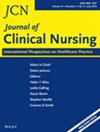The Relationship Between Neonatal Nurses' e-Health Literacy Levels and Care Behaviours: A Cross-Sectional Study
Abstract
Aim
The study aims to determine the relationship between e-health literacy level and the care behaviour of neonatal nurses.
Background
E-health literacy is becoming increasingly important, as health-related information can be obtained easily and quickly from electronic sources.
Design
The study is a cross-sectional study.
Methods
The sample of the study consists of 384 neonatal nurses working in different hospitals in Türkiye. An introductory form, the E-Health Literacy Scale (eHEALS), and the Care Behaviours Inventory-24 (CBI-24) were used for data collection. The data collection forms were created using Google Forms.
Result
eHEALS 4.32 ± 0.551, CBI-24 5.58 ± 0.567, CBS-24 sub-dimension: Assurance 5.58 ± 0.591, CBS-24 sub-dimension: Knowledge-Skills 5.64 ± 0.561, CBI-24 sub-dimension: Respect 5.56 ± 0.565, CBI-24 sub-dimension: Connectedness 5.52 ± 0.637 was found. It was determined that there was a very weak positive relationship between eHEALS, CBI-24 and sub-dimension scores (p < 0.001). A significant relationship was found between the eHEALS and the independent variables age, female, living in the Southeastern Anatolia region, working in a public hospital, using the internet for their profession, and CBI-24 sub-dimension: assurance (F = 6.111; p < 0.001).
Conclusion(s)
The relationship between e-health literacy and care behaviours of neonatal nurses was examined. Neonatal nurses' was found eHEALS, CBI-24, and sub-dimension scores had a high and very weak positive relationship. A significant relationship was found between the eHEALS level and age, female, Southeastern Anatolia region, state hospital, using the internet for their profession, and assurance sub-dimension.
Impact
Study determines the eHEALS of neonatal nurses and provides information about this field. Interventions aimed at eHEALS should be developed and implemented at both the institutional and individual levels.
Reporting
STROBE, No Patient or Public Contribution.

 求助内容:
求助内容: 应助结果提醒方式:
应助结果提醒方式:


